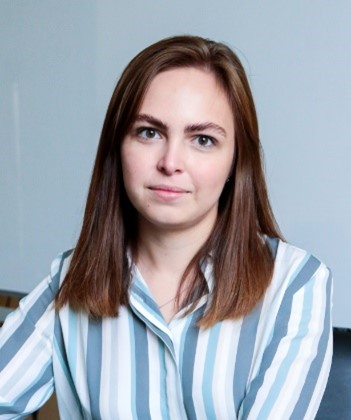


Name:Tatiana Poliakova
Title (academic degree): Master
Speciality: Chemistry, Radiochemistry
e-mail:poliakovatr@my.msu.ru
Personal profile
Tatiana Poliakova is Teaching assistant at the Chemistry Faculty, Shenzhen MSU-BIT University. Her scientific interests include the study of technogenic radioactivity in the environment, the behavior of emergency uranium fuel microparticles under various conditions, inorganic synthesis and study of actinide compounds. Her teaching activities have been ongoing since 2021. She develops new tasks and methodological manual as part of various training courses. Takes part in projects supported by the Russian Science Foundation and the Ministry of Education of the Russian Federation.
Educational experience
2014-2020 Diploma in higher school education (specialist programme): Fundamental and applied chemistry. Chemist. Lecturer in Chemistry.
Lomonosov Moscow State University, Chemistry Department, Radiochemistry Division.
Subject: “Hot” particles in environmental objects: search and characterization.
Scientific supervisor PhD Irina E. Vlasova
2017/08 Student
European Summer school 2017: Radiochemistry and Nuclear Instrumentation (Low Level Radioactivity)
Faculty of Physics and Engineering of the University of Strasbourg, Strasbourg, France
Institute for Nuclear Waste Disposal (INE) of the Karlsruhe Institute of Technology, Karlsruhe, Germany
2019/01 Trainee
Institute for radiation safety and ecology, National Nuclear Center of Kazakhstan Republic, Kurchatov city, Kazakhstan
2020/03 Student
The MEET-CINCH Spring School 2020, Larnaka, Cyprus
2020/09 Student
The MEET-CINCH Spring School 2020, Larnaka, Cyprus
Since 2020 PhD student
Lomonosov Moscow State University, Chemistry Department, Radiochemistry Division.Scientific supervisor PhD Irina E. Vlasova
2021/01-2021/03 Trainee
TOP Group at The Rossendorf Beamline of The European Synchrotron (ESRF) in France, operated by the Institute of Resource Ecology at Helmholtz-Zentrum Dresden-Rossendorf (HZDR) in Germany, Grenoble, Frence Scientific supervisor Dr Habil Kristina Kvashnina
2022/01-2022/04 Student
Experimental Radioecology school, Norwegian University of Life Sciences (NMBU), Oslo, Norway, online
Work experience
2021/09-2021/12 Trainee-teacher
Course ?Fundamentals of radiochemistry and radioecology?, Chemistry Department of Lomonosov Moscow State University
2021-2022 Supervising of term papers:
Alexandra Smirnova, term paper in Inorganic Chemistry
Subject: “Uranium oxides synthesis as simple models of “hot” particles”
Alexandra Smirnova, term paper in Analytical Chemistry.
Subject “Determination of radioactivity ratio in “hot” particles using Digital Radiography method”
Vladislava Zubkova, term paper in Inorganic Chemistry.
Subject: “Synthesis and characterization of trivalent uranium salt”
Nikolay Stroganov, term paper in Physical Chemistry.
Subject: “Dissolution kinetics of uranium dioxide in simulators of human body liquids”
Vladislava Zubkova, term paper in Analytical Chemistry.
Subject: “Radiographic approach for studying the distribution of radioactivity in soil samples and vitrified particles from the Semipalatinsk test site”
Sofia Seraya, term paper in Analytical Chemistry.
Subject: “Determination of alpha-emitting radionuclides in natural samples by alpha-track radiography”
2022/09-2023/01 Teacher
Course ?Fundamentals of radiochemistry and radioecology?, Chemistry Department of Lomonosov Moscow State University
Since 2022 Reading individual lectures within the courses, Chemistry Department of Lomonosov Moscow State University:
?Environmental Radioactivity?
?Modern physico-chemical research methods in radiochemistry and beyond?
Since 2023 Teaching assistant at the Chemistry Faculty, Shenzhen MSU-BIT University. Courses:
General and Inorganic Chemistry
2024 development of a methodological manual for the task “Identification of the source of radioactive contamination of natural objects” of the special workshop “Radiochemistry” for 5th year students of Chemistry Department of Lomonosov Moscow State University
Publications
1. Uranium oxides structural transformation in human body liquids / T. Poliakova, A. Krot, A. Trigub et al. // Scientific reports. — 2023. — Vol. 13, no. 1.
2. Исследование поведения аварийных топливных выпадений в окружающей среде / М. В. Желтоножская, Н. В. Кузьменкова, И. Э. Власова и др. // Наукоемкие технологии. — 2023. — Т. 24, № 1. — С. 13–23.
3. Nuclear melt glass from experimental field, semipalatinsk test site / I. E. Vlasova, V. O. Yapaskurt, A. A. Averin et al. // Energies. — 2022. — Vol. 15, no. 23. — P. 9121.
4. Sorption of Cs(I) and Np(V) on clays of the Ostrozhansk deposit (Belarus). Semenkova A.S., Poliakova T.R., Korob D.K., Seregina I.F., Micheev I.V., Krupskaya V.V., Romanchuk A.Y., Kalmykov S.N., Radiochemistry — 2019. — V. 61, № 5. — P. 433–438.
5. Poliakova T. R., Weiss, M., Trigub, A. L., Yapaskurt V. O., Zheltonozhskaya M. V., Vlasova I. E., Walther C., Kalmykov S. N. Chernobyl fuel microparticles: uranium oxidation state and isotope ratio by HERFD-XANES and SIMS // Journal of Radioanalytical and Nuclear Chemistry. 2024.
6. Poliakova T. R., Vlasova I. E., Kalmykov S. N. Imaging plate radiography for non-destructive determination of the radioactivity fraction in “hot” particles // Nuclear Instruments and Methods in Physics Research, Section A: Accelerators, Spectrometers, Detectors and Associated Equipment. 2024. Vol. 1065. P. 169555.

地址:深圳市龍崗區(qū)大運新城國際大學園路1號
電話:0755-28323024
郵箱:info@smbu.edu.cn
深圳北理莫斯科大學版權(quán)所有 - 粵ICP備16056390號 - 粵公網(wǎng)安備44030702002529號
